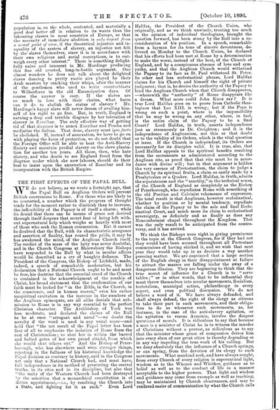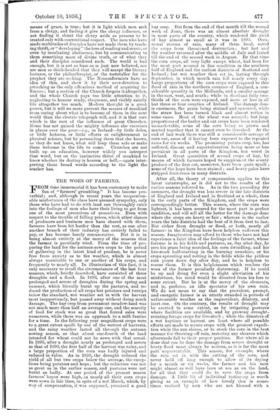THE FIRST EFFECTS OF THE PAPAL BULL.
WE do not believe, as we wrote a fortnight ago, that the Papal Bull on Anglican Orders will prevent British conversions to Rome. For those who are likely to be converted, a number which the progress of thought tends for the moment rather to diminish than to increase, the inflexibility of the Papacy is of itself a charm ; while its denial that there can be means of grace not derived through itself deepens that secret fear of being left with- out supernatural help which weighs so heavily with most of those who seek the Roman communion. But it cannot be doubted that the Bull, with its characteristic arrogance and assertion of finality, has roused the pride, it may be has awakened the mind, of the Anglican Church itself. The verdict of the mass of the laity was never doubtful, and in the Church Congress at Shrewsbury the Bishops have responded to the Bull by what in secular affairs would be described as a cry of haughty defiance. The President of the Congress, the Bishop of Lichfield, made, indeed, a speech of remarkable moderation, but his declaration that a National Church ought to be and must be free, his doctrine that the essential creed of the Church is contained in the acknowledgment of the sonship of Christ, his broad statement that the confirmation of our faith must be looked for " in the Bible, in the Church, in the conscience, and in human reason," even his rather unspiritual exultation in the increase in the numbers of the Anglican episcopate, are all alike denials that sub- mission to Rome is in any way essential to the perfect Christian character. The Archbishop of York was less moderate, and declared the claims of the Bull to be at once " arrogant and novel "—we doubt the novelty if the word is used in any usual sense—and held that " the net result of the Papal letter has been first of all to emphasise the isolation of Rome from the rest of Christendom ; to shut her in within the barred and bolted gates of her own proud citadel, from which she would shut others out." And the Bishop of Peter- borough, who has elsewhere said even stronger things, rejecting in the fullness of his historical knowledge the Papal decision as contrary to history, said in the Congress not only that a National Church had, and must have, full independence in its method of presenting the central truths, in its rites and in its discipline, but also that " the unity of the Western Church had been destroyed by the assertion that a monarchical constitution is of divine appointment,—i.e., by resolving the Church into a State, and fighting for it as such." Even Lord Halifax, the President of the Church Union, who originally, and as we think unwisely, trusting too much in the opinion of individual theologians, brought the question forward, has been stung by the Bull into a re- consideration of his position. In a speech, remarkable from a layman for its tone of sincere devoutness, de- livered on Monday to the Church Union, he declared that his efforts had been met at Rome by a determination to make the worst, instead of the best, of the Church of England, and by a conspicuous absence of love and sym- pathy, and that the Anglican Church would withstand the Papacy to its face as St. Paul withstood St. Peter. In other and less ecclesiastical phrase, Lord Halifax claims for his Church and himself the right of private judgment; that is, he denies the authority of the Papacy to bind the Anglican Church when that Church disapproves, —wherewith the " authority " of Rome disappears like a dream. What more could John Knox say ? It is true Lord Halifax goes on to prove from Catholic theo- logians that Leo XIII. is wrong; but if the Pope is wrong on such a point, where is the impossibility that he may be wrong on any other, where, in fact, is the entire claim of the Papacy to be a final Court? Lord Halifax, in truth, asserts independence just as strenuously as Dr. Creighton; and it is the independence of Anglicanism, not this or that doubt as to the validity of its Orders, which is the vital question at issue. If the Church is independent, its Orders are necessarily for its disciples valid. It is true, also, that Lord Halifax appeals to the spiritual benefits resulting from the sacraments as administered according to the Anglican rite, as proof that that rite must be in accor- dance with divine will ; but in that argument is hidden the very essence of Protestantism, the claim to judge a Church by its spiritual fruits, a claim as easily made by a Presbyterian or a Quaker. Lord Halifax, in truth, admits the separateness and the " sanctity," in the technical sense, of the Church of England as completely as the Bishop of Peterborough, who repudiates Rome with something of the old Puritan and Calvinist vehemence of expression. The total result is that Anglicans, however ecclesiastical, whether by position or by mental tendency, repudiate the claim of the Papacy to be the sole and final Eccle- siastical Court, and much more its claim to ecclesiastical sovereignty, as definitely and as finally as does any Nonconformist chapel throughout the Kingdom. That was the only result to be anticipated from the contro- versy, and it has arrived.
We think the Bishops were right in giving prominence to the topic at the Church Congress, for if they had not they would have been accused throughout all Protestant communions of having shirked it, and we wish that next year they would take up in as decisive a way another pressing matter. We are convinced that a large section of the English clergy in their disappointment at failure to attract the masses are falling under the sway of a dangerous illusion. They are beginning to think that the true secret of influence for a Church is to " serve tables ;" or in other words, that to be influential they must throw themselves into secular movements, Socialism, teetotalism, municipal action, philanthropy in every aspect, and even political discussion. We do not believe a word of it. We have always defended, and shall always defend, the right of the clergy as citizens to take their part in such movements, and their obliga- tion to do so whenever such movements, as, for instance, in the case of the anti-slavery agitation, or the agitation to rescue Armenia, involve the deepest questions of morals. It is ridiculous to say that because a man is a minister of Christ he is to witness the murder of Christians without a protest, as ridiculous as to say that the minister whose grace of compassion drives him into every slum of our great cities is thereby degrading or in any way impeding the true work of his calling. But we deny absolutely that the influence of a Church springs, or can spring, from the devotion of its clergy to such movements. What mankind seek, and have always sought, from every Church of every religion is supernatural light, wisdom as to the Whence and Whither, guidance as to belief as well as to the conduct of life in a manner acceptable to the higher powers. That light and wisdom and guidance may come from example as well as teaching, may be maintained by Church observances, and may be rendered easier of communication by what the Church calls means of grace, is true ; but it is light which men seek from a clergy, and finding it give the clergy influence, or not finding it shunt the clergy aside as persons to be treated only with conventional respect. The men who have made multitudes of disciples have not made them by teach- ing thrift, or " developing" the love of reading and music, or even by inculcating abstinence, but by communicating to them something more of divine truth, or of what they and their disciples considered such. The world is bad enough, but it is not so base as is just now believed, nor are men so thick-headed that they will accept the literary lecturer, or the philanthropist, or the teetotaller for the prophet they are seeking. The Nonconformists have an idea of this, and show it by their over-devotion to preaching as the only efficacious method of acquiring in- fluence ; but a section of the Church forgets it altogether, and the whole Church pays too little attention to it, neglecting to honour study, eloquence, and visibly saintly life altogether too much. Modern thorght is a great power, but it will no more prevent the masses of mankind from caring about what is to become of them in the next world than the electric telegraph will, and it is that care which is the root of the influence of great Churches. Rome has not gained the mighty influence she exercises in places over the poor—e.g., in Ireland—by little doles, or little lectures, or little efforts at enlightenment in physical science, but by persuading them that she knows, as they do not know, what will keep them safe or make them welcome in the life to come. Churches are not built up on education, however widely you interpret that word, but on the instinctive thirst of mankind to know whether its destiny is heaven or hell,—again inter- preting those broad words according to the light the teacher has.



















































 Previous page
Previous page